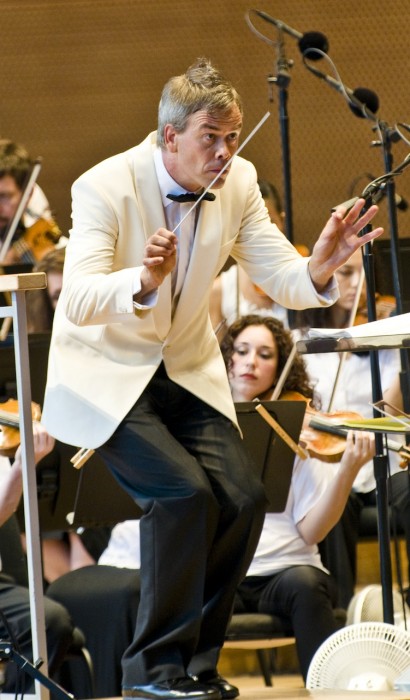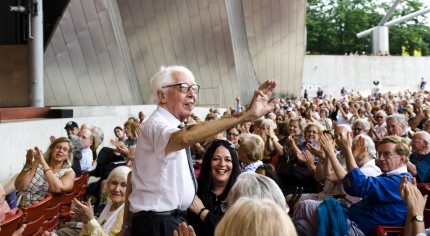Lintu, Grant Park Orchestra lift a lightweight Russian program

On paper Wednesday night’s Grant Park Orchestra concert led by Hannu Lintu looked like a case of an unbearable lightness of programmatic being — less than an hour of music twining one of Prokofiev’s lesser symphonies alongside a work from one of Russia’s lesser composers.
While it still amounted to a pretty thin evening, the concert served as a worthy enough showcase for the high gleam and professionalism of the Grant Park players, elevating a slight program above its particulars with the aid of an inspiring conductor.
Lintu has been a regular presence at the lakefront festival in recent years and this summer he was invited to lead the orchestra in two programs, a rarity for a Grant Park podium guest. The lanky 43-year-old is clearly making a major career in his homeland, becoming chief guest conductor of the Finnish Radio Symphony Orchestra in the fall of 2012 and the ensemble’s chief conductor the following year.
Prokofiev’s Symphony No. 7 was written in 1952, the year before the composer’s death. While Prokofiev was by then suffering major health problems and in great pain, there’s little drama or gloom apparent in the work.
Still, Prokofiev’s final symphony is a strange and enigmatic work. The opening Moderato segues from melancholy unease to a perky child-like theme and a broadly lyrical melody that could have come from the composer’s Romeo and Juliet. The second moment is a bustling waltz, followed by a wistful Andante and a motoric closing movement.
Prokofiev’s Seventh is not exactly a masterpiece — only two of his symphonies are — but it’s crafted with characteristic polish and individuality, and received sterling advocacy by Lintu and the Grant Park Orchestra. Lintu’s taut and concentrated direction allowed this rather chaotic work to unfold naturally, and the Finnish conductor elicited responsive playing from the ensemble with a striking degree of dynamic and expressive detailing. Strings were notably lustrous while woodwinds and brass gave a tart satiric bite to the contrasting sections of the waltz movement. Lintu was especially deft in the finale, accelerating the galumphing main theme, drawing a luxuriant reprise of the lyrical melody and likely fooling most listeners with Prokofiev’s quiet false ending before the coda’s final blast.
At least Prokofiev’s symphony has enough wit, elegance and scoring mastery to make an effective impact, which is more than one can say for Shchedrin’s Old Russian Circus Music. Also known as his Concerto for Orchestra No. 3, the Russian’s work was written for the centenary season of the Chicago Symphony Orchestra and Lorin Maazel led the premiere in 1990.
Old Russian Circus Music inhabits some of the same landscape as Petruska in its dingy atmosphere and darkly ironic take on circus/fair life. But where Stravinsky created a touching and ground-breaking masterpiece out of the plight of the tragic anthropomorphic puppet, Shchedrin’s music is more akin to a symphonic whoopee cushion, a 25-minute, not particularly funny musical joke.
Lintu and the Grant Park musicians delivered the raucous circus marches, satiric bombast, bird sound effects, musician applause and would-be musical punchlines with individual panache and all due corporate commitment. Lintu’s exacting control and balancing were undeniably impressive in this anarchic weirdness but would have been even more so had it been applied to more worthy music.
Fortunately, this weekend’s program of Sibelius’s Kullervo symphony will give him that opportunity.
_____

The preconcert announcements took note of former Grant Park Orchestra member Norman Schoer who was in the audience celebrating his 100th birthday. A member of the Grant Park viola section for 27 years, Schoer joined the orchestra in 1968 and retired in 1995 at the age of 84.
Posted in Performances




